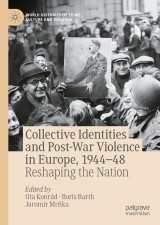Details

Collective Identities and Post-War Violence in Europe, 1944-48
Reshaping the NationWorld Histories of Crime, Culture and Violence
|
139,09 € |
|
| Verlag: | Palgrave Macmillan |
| Format: | |
| Veröffentl.: | 27.11.2021 |
| ISBN/EAN: | 9783030783860 |
| Sprache: | englisch |
| Anzahl Seiten: | 334 |
Dieses eBook enthält ein Wasserzeichen.
Beschreibungen
This book analyses the process of ‘reshaping’ liberated societies in post-1945 Europe. Post-war societies tried to solve three main questions immediately after the dark times of occupation: Who could be considered a patriot and a valuable member of the respective national community? How could relations between men and women be (re-)established? How could the respective society strengthen national cohesion? Violence in rather different forms appeared to be a powerful tool for such a complex reshaping of societies. The chapters are based on present primary research about specific cases and consider the different political, mental, and cultural developments in various nation-states between 1944 and 1948. Examples from Italy, France, Norway, Denmark, Greece, Ukraine, Lithuania, Belarus, Czechoslovakia, and Hungary demonstrate a new comparative and fascinating picture of post-war Europe. This perspective overcomes the notorious East-West dividing line, without covering the manifold differences between individual European countries.<br>
<div>PART I. RESHAPING THE NATION.- Introduction; Ota Konrád, Boris Barth, Jaromír Mrňka.- The End of the War and the Beginning of the Peace: Where Violence Leaves Off and Reconstruction Begins: Continental Europe, 1944-1947; Norman Naimark.- PART II. JUSTICE.- Redefining National Identities through Justice: A Comparative Analysis of Italy and France; Barbara De Luna and Greta Fedele.- Purges, Patriotism, and Political Violence: The Danish Case, 1944-1945; Henrik Lundtofte.- 'Mentalities of War, Mentalities of Peace': Capital Punishment in the Norwegian ‘Treason Trials’, 1941-1948; Anika Seemann.- PART III. GENDER.- 'German Brats and Tarts': Gender, Sexuality, and Collective Memory in Post-War Norway; Caroline Nilsen.- Gender, Ethnicity, and Multidirectional Violence during the Last Months of German Rule in Lithuania: A Case Study of Local Force Battalions; Justina Smalkyté.- PART IV. NATION AND NATIONALISM.- Assessing National 'Consciousness': The Belarusian Home Guard, 1944-1945; Aleksandra Pomiecko.- Cleansing Greece of the Miasma of its 'Sudeten': Macedonian Slavs as an Unwanted Minority in the Aftermath of the Second World War; Tasos Kostopoulos.- Between Nation and Religion: Czech Protestants and the Transfer of the Sudeten Germans, 1945-1948; Ondřej Matějka.- PART V. CITIZENSHIP.- 'Pure Christians' vs. 'Working Citizens of the Democratic Era': How the Claimants of Jewish Property perceived Citizenship in Hungary; Borbála Klacsmann.- A Glass Half Full or Half Empty? The Postwar Treatment of the German Minority in Denmark; Peter Thaler.- PART VI. CONCLUSION.- Conclusion; Christoph Cornelißen.</div>
<p><b>Ota Konrád </b>is Associate Professor of Modern History at Charles University in Prague, Czech Republic. He has worked on topics dealing with the history of East-Central Europe in the twentieth century. Recently, he co-edited <i>In the Shadow of the Great War: Physical Violence in East-Central Europe, 1917-1923 </i>(2021). </p><p><b>Boris Barth</b> is Professor of Modern and Contemporary History at Charles University in Prague, Czech Republic. His publications include <i>Europa nach dem Großen Krieg. Die Krise der Demokratie in der Zwischenkriegszeit 1918-1938 </i>(2016) and <i>Civilizing Missions in the Twentieth Century</i> (edited with Rolf Hobson, 2020).</p><b>Jaromír Mrňka</b> is Researcher at the Institute for the Study of Totalitarian Regimes, and Junior Research Fellow at Charles University in Prague, Czech Republic. He has studied the social mechanisms of denunciation, collective violence, and conflict-related acts of sexual violence in the Czech Lands during the Second World War and its aftermath.
This book analyses the process of ‘reshaping’ liberated societies in post-1945 Europe. Post-war societies tried to solve three main questions immediately after the dark times of occupation: Who could be considered a patriot and a valuable member of the respective national community? How could relations between men and women be (re-)established? How could the respective society strengthen national cohesion? Violence in rather different forms appeared to be a powerful tool for such a complex reshaping of societies. The chapters are based on present primary research about specific cases and consider the different political, mental, and cultural developments in various nation-states between 1944 and 1948. Examples from Italy, France, Norway, Denmark, Greece, Ukraine, Lithuania, Belarus, Czechoslovakia, and Hungary demonstrate a new comparative and fascinating picture of post-war Europe. This perspective overcomes the notorious East-West dividing line, without covering the manifold differences between individual European countries.<div><b><br></b></div><div><b>Ota Konrád </b>is Associate Professor of Modern History at Charles University in Prague, Czech Republic. He has worked on topics dealing with the history of East-Central Europe in the twentieth century. Recently, he co-edited <i>In the Shadow of the Great War: Physical Violence in East-Central Europe, 1917-1923 </i>(2021). <br></div><div><p><b> </b></p><p><b>Boris Barth</b> is Professor of Modern and Contemporary History at Charles University in Prague, Czech Republic. His publications include <i>Europa nach dem Großen Krieg. Die Krise der Demokratie in der Zwischenkriegszeit 1918-1938 </i>(2016) and <i>Civilizing Missions in the Twentieth Century</i> (edited with Rolf Hobson, 2020).</p><p> </p><p><b>Jaromír Mrňka</b> is Researcher at the Institute for the Study of Totalitarian Regimes, and Junior Research Fellow at Charles University in Prague, Czech Republic. He has studied the social mechanisms of denunciation, collective violence, and conflict-related acts of sexual violence in the Czech Lands during the Second World War and its aftermath.</p></div>
Considers violence as an integral part of the (re-)establishment of national states in post-war Europe Discusses post-war trials of alleged collaborators and national traitors, gendered aspects of post-war violence Examines the different political and cultural developments in various nation-states after the war ended

















